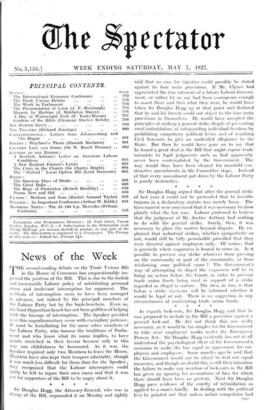Sir Douglas Hogg, the Attorney-General, who was in charge of
the Bill, expounded it on Monday and rightly said that no ease for injustice could possibly be stated against its four main provisions. If Mr. Clynes had appreciated the true interests of a future Labour Govern- ment, or rather let us say had been courageous enough to assert there and then what they were, he would have taken Sir Douglas Hogg up at that point and declared that he and his friends could not object to the four main provisions in themselves. lie would have accepted the principles of making a general strike illegal, of preventing cruel intimidation, of safeguarding individual freedom by prohibiting compulsory political levies and of requiring Civil Servants to give an undivided allegiance to the State. But then he would have gone on to say that he found a great deal in the Bill that might expose trade unionists to legal judgments such as had apparently never been contemplated by the Government. The way would thus have been cleared for manifold con- structive amendments in the Committee stage. Instead of that every amendment put down by the Labour Party is purely destructive.














































